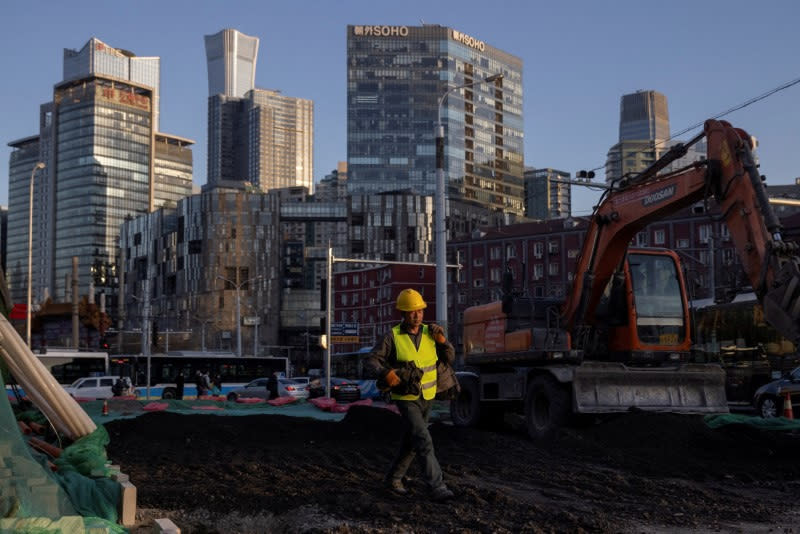China Evergrande, the world’s most debt-laden developer, has sold its stake in a major project in Shanghai to state-owned lender China Everbright Group, according to a report by Nikkei Asia on Friday.
Evergrande revealed the move in a disclosure to the Hong Kong Exchange late on Thursday, saying its main developer Hengda Real Estate had agreed to sell its 30% stake in a joint venture with Everbright’s Xinglong Trust, which is part of the Shanghai North Bund Project but currently suspended because of Evergrande’s liquidity crisis.
The stake was sold for 663.15 million yuan ($93.5 million), so Evergrande would record a loss of about 55 million yuan, but Evergrande president Siu Shawn said in the filing the disposal had to be done to avoid punitive actions over the project and to bring in cash to fund delivery of other properties, the report said.
ALSO SEE: China 2024 Budget Plans 3% GDP Outlay, Plus Special Bonds
New home prices down for 5th month
Meanwhile, China’s property sector worsened in November as negative home buyer sentiment and indebted developers drove down sales and investment, while broader retail sector activity missed forecasts as recent stimulus struggled to revive demand.
The world’s second-largest economy has struggled to mount a strong post-Covid recovery as distress in the housing market, local government debt risks and weakening global demand slowed momentum.
While the Asian giant grew faster-than-expected in the third quarter, domestic demand has remained tepid and manufacturers have had to discount prices to find buyers.
A flurry of policy support measures have proven only modestly beneficial, raising pressure on authorities to roll out more stimulus as analysts say different parts of the economy are running at different speeds and long-standing issues persist.
“Transactions are typically depressed towards the end of the year, and the property sector in general does not want to take on more leverage and house prices are still too high compared to urban incomes,” Dan Wang, chief economist at Hang Seng Bank China, said.
“People will just wait out this downward spiral,” she added.
China’s new home prices fell for the fifth straight month in November, data from the National Bureau of Statistics (NBS) showed on Friday, while property investment fell 9.4% January-November year-on-year, after a 9.3% drop in January-October.
Retail sales up in November, but consumer prices falling
Industrial output in the world’s second-largest economy grew 6.6% in November year-on-year, faster than the 4.6% gain in October and beating expectations for a 5.6% increase in a Reuters poll. It also marked the strongest growth since September 2022.
Retail sales rose 10.1% in November, accelerating from a 7.6% increase in October but missed analysts’ expectations for a 12.5% leap mainly fuelled by the low base effect in 2022 when Covid curbs disrupted consumers and businesses.
“The market expected pro-growth policies to quickly bear fruit, which has not yet been effectively translated into near-term growth due to the constraints of policy transmission and business confidence,” Bruce Pang, chief economist at Jones Lang Lasalle, said.
Fixed asset investment expanded 2.9% in the first 11 months of 2023 from the same period a year earlier, missing expectations for a 3% rise. It grew 2.9% in the January-October period.
Friday’s data follows other November indicators that show the economy struggling for momentum. Imports grew for the first time in six months, but analysts attributed this to manufacturers offering unsustainable discounts and imports contracted again. Consumer prices fell at the fastest in three years and factory deflation deepened.
The patchy recovery has prompted analysts to warn that China may decline into Japanese-style stagnation later this decade unless policymakers take steps to reorient the economy towards household consumption and market-allocation of resources.
Policy advisers say the government will need to implement further stimulus should it wish to sustain an annual economic growth target of “around 5%” next year, which would match this year’s goal.
On Tuesday, top leaders said they would step up policy adjustments to support economic recovery in 2024, with a focus on boosting domestic demand given the slowdown in the global economy.
- Jim Pollard with Reuters
ALSO SEE:
Country Garden to Gain $428m From Wanda Unit Stake Sale
China’s Wanda in Deal With Investors to Avoid $4bn Repayment
China Evergrande Stock Jumps as Liquidation Hearing Put Off
China Evergrande Chairman ‘Suspected of Crimes’, Company Says
























